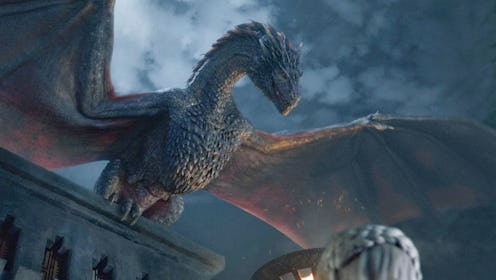
After waiting 10 long months, Game Of Thrones Season 7 is finally just around the corner… but now audiences will have another epic fantasy television series to start waiting for. According to Variety, a TV show based on The Wheel Of Time, the classic series of books by Robert Jordan, is finally moving forward. And, trust me, Game of Thrones fans really want to pay attention to this new.
Although fans of novels have been longing for a screen translation for years, this is the first major news since a potential adaptation was announced almost one year ago. But now the Wheel Of Time TV show has a production studio (Sony Pictures Television) as well as a showrunner (Rafe Judkins). The adaptation has yet to land at a specific network — it will undoubtedly be shopped around to the likes of HBO, Starz, and Netflix in the near future — but, in the meantime, there are plenty of reasons for Game Of Thrones fans to get excited about this upcoming series. In fact, the two projects share a lot more in common than just the generic "fantasy" label.
Both Jordan's The Wheel Of Time and Martin's A Song Of Ice And Fire are book series that had a small but loyal base of diehard genre fans before their respective TV adaptations; news of the Wheel Of Time show will likely cause a spike in interest in Jordan's books the way Game Of Thrones did for Martin's. Both are also incredibly dense; if you thought ASOIAF was long, with five books totaling some 4,000-odd pages, just wait until you dive until Wheel Of Time. That series clocks in at a whopping 14 novels totaling almost 12,000 pages of material, starting with 1990's The Eye Of The World and ending with 2013's A Memory Of Light.
Both works also draw on a great wealth of fictional history that has taken place before the start of the first novel. While ASOIAF is informed by events such as Robert's Rebellion, Aegon's Conquest, and the Doom of Valyria, The Wheel Of Time traces its roots back thousands of years to an ancient conflict between The Creator and The Dark One — who can only be defeated by a savior known as The Dragon.
Like Game Of Thrones, The Wheel Of Time also upends the traditional hyper-masculine expectations of the fantasy genre. In Martin's Westeros, compelling female characters — like Daenerys, Cersei, Arya, Sansa, and more — have triumphed despite the repressively patriarchal society they're born into. In Jordan's Andor (and other lands), the author has crafted a fictional culture in which his female characters are equal — if not superior — to men. (The Dark One poisoned the source of magical power, so that wielding it will always drive men insane; as a result, only women are allowed to use magic.)
However, lest you think The Wheel Of Time would just be "another" Game Of Thrones, there are enough differences between them that the latter series won't feel redundant. First of all, there's the length; if you're dreading the end of Game Of Thrones and wishing it could run forever, well… The Wheel Of Time could potentially have a run lasting twice as long as GoT's, thanks to the overwhelming length of its source material. There's also the fact that The Wheel Of Time is already finished — which gives it a huge advantage over Game Of Thrones, the source material for which is still very much in progress (and very much in release date limbo).
Furthermore, while Martin's tale is largely a sprawling saga of political intrigue with a vague supernatural threat amassing in the background and only infrequently encountered, Jordan's series is very different. At its core, it is much more a straightforward hero's journey, with a central conflict between one protagonist — Rand al'Thor, The Dragon Reborn — and one main villain — The Dark One. In that way, The Wheel Of Time is more akin to The Lord Of The Rings (with Frodo going on a hero's journey to defeat Sauron) than it is to A Song Of Ice And Fire.
With only 13 episodes left to go before Game Of Thrones comes to an end, this news couldn't have arrived at a better time for genre fans. While nothing will ever replace GoT in our hearts, The Wheel Of Time — with its dense mythology, terrifying villains, kick-ass female characters, and mystical action — will undoubtedly be a fitting heir to TV's fantasy throne.